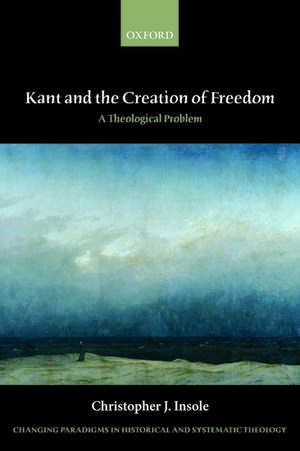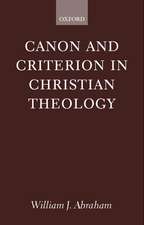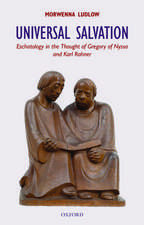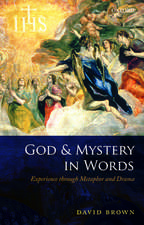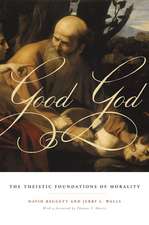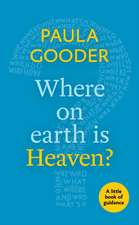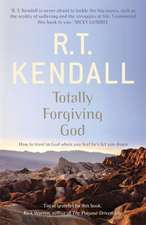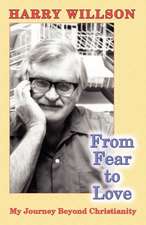Kant and the Creation of Freedom: A Theological Problem: Changing Paradigms in Historical and Systematic Theology
Autor Christopher J. Insoleen Limba Engleză Paperback – 17 dec 2015
| Toate formatele și edițiile | Preț | Express |
|---|---|---|
| Paperback (1) | 223.02 lei 31-37 zile | |
| OUP OXFORD – 17 dec 2015 | 223.02 lei 31-37 zile | |
| Hardback (1) | 876.96 lei 31-37 zile | |
| OUP OXFORD – 30 mai 2013 | 876.96 lei 31-37 zile |
Din seria Changing Paradigms in Historical and Systematic Theology
- 17%
 Preț: 190.88 lei
Preț: 190.88 lei - 12%
 Preț: 615.90 lei
Preț: 615.90 lei - 30%
 Preț: 502.32 lei
Preț: 502.32 lei - 28%
 Preț: 474.06 lei
Preț: 474.06 lei - 30%
 Preț: 788.74 lei
Preț: 788.74 lei - 34%
 Preț: 816.02 lei
Preț: 816.02 lei - 12%
 Preț: 308.75 lei
Preț: 308.75 lei - 31%
 Preț: 801.39 lei
Preț: 801.39 lei - 26%
 Preț: 615.13 lei
Preț: 615.13 lei - 30%
 Preț: 585.56 lei
Preț: 585.56 lei - 25%
 Preț: 570.02 lei
Preț: 570.02 lei - 30%
 Preț: 587.57 lei
Preț: 587.57 lei - 25%
 Preț: 505.31 lei
Preț: 505.31 lei - 21%
 Preț: 587.96 lei
Preț: 587.96 lei - 27%
 Preț: 625.83 lei
Preț: 625.83 lei
Preț: 223.02 lei
Preț vechi: 258.83 lei
-14% Nou
Puncte Express: 335
Preț estimativ în valută:
42.68€ • 44.67$ • 35.52£
42.68€ • 44.67$ • 35.52£
Carte tipărită la comandă
Livrare economică 19-25 martie
Preluare comenzi: 021 569.72.76
Specificații
ISBN-13: 9780198755197
ISBN-10: 0198755198
Pagini: 280
Dimensiuni: 158 x 232 x 16 mm
Greutate: 0.43 kg
Editura: OUP OXFORD
Colecția OUP Oxford
Seria Changing Paradigms in Historical and Systematic Theology
Locul publicării:Oxford, United Kingdom
ISBN-10: 0198755198
Pagini: 280
Dimensiuni: 158 x 232 x 16 mm
Greutate: 0.43 kg
Editura: OUP OXFORD
Colecția OUP Oxford
Seria Changing Paradigms in Historical and Systematic Theology
Locul publicării:Oxford, United Kingdom
Recenzii
Christopher Insole has done something remarkable. He has provided a novel and credible account of the development of Kant's transcendental idealism ... This is an excellent book.
Christopher Insole's erudite work contributes to [the] revitalization of the metaphysical Kant - Insole's scrupulous work must be considered a success - in providing a coherent case for thinking that theological questions were at least as prominent among Kant's concerns in his Pre-Critical period as any of the more familiar philosophical challenges. One of this work's merits is the degree of sophistication with which it engages with its topics. Although its central claim is contentious, the book touches on a range of other key topics in Kant's philosophy, and always perceptively. This work will then reward any serious study. It is a very well-written and diligently researched piece of work, one that brings the more metaphysical interpretation of Kant's Critical philosophy into direct contact with traditional theological concerns.
Theologically literate engagements with the work of Immanuel Kant of the kind exemplified in this study by Christopher Insole are enormously welcome. It is historically sensitive, textually attentive and argumentatively deft. As well as being concise and clear, Insole's thesis is original and compelling. There is no finer theological engagement with Kant in print.
Kant and the Creation of Freedom is carefully researched and closely argued ... he has set high standards for debate through his close attention to the primary sources ... What Insole has done, and done marvellously, is to relieve readers of the fiction that they can understand Kant without understanding the religious and theological features of his work
Christopher Insole has done something remarkable. He has provided a novel and credible account of the development of Kants transcendental idealism His book is not intended to replace familiar accounts, but to supplement and complicate them. But it will be difficult to read Kant with the same eyes after reading Insole ... This is an excellent book ... Many different readers and many different kinds of readers will profit from it
[A] thought-provoking premiss that brings to light a theological probing of Kantian philosophy.
Insole's case for ascribing a double-affection view to Kant, arising out of concern to preserve a space for human freedom within a divinely created order, is scrupulously argued textually, in drawing from both minor and major writings over the full range of Kant's career. In light of Insole's textual work, it will be hard to deny either that Kant seriously held a double affection view in many places within his critical period or that this view was significantly motivated by a theological problem
Lucid and, especially for those familiar only with Kant's critical period, helpful discussions of several pre-critical texts together with an engagement with selected secondary literature. Here Insole's exposition is nuanced and sure-handed.
The book provides an exceptionally clear account of multiple aspects of Kants thought as they bear upon this relatively neglected central theme as well as a host of new insights along the way. One of its overt advantages is that it does so against the background of an extensive familiarity not only with Kants late and early writings and those of his interpreters, but also with the Christian theological tradition. Insole's careful tracking of Kant's evolving pre-critical awareness of the possible competition between divine and human freedom is studied and convincing
There is no shortage of secondary works on Kant's conception of freedom, which he himself tells us is the central concern of his philosophy. However, there are relatively few works that examine Kant's pre-Critical understanding of freedom, or the motives behind his shift to the views we more traditionally associate with him. Kant and the Creation of Freedom is a welcome remedy to such neglect. Insole's work will be of interest not only to Kant scholars, but also to theologians and philosophers of religion, particularly those interested in the relation of Kant to medieval and early modern thought. In addition to the central topic of Kant's changing views of freedom, Insole includes helpful discussions of the views of Aquinas, Leibniz, and Suárez, and well as a chapter devoted to whether Kant really defends belief in God and noumenal substances or holds some weaker or more voluntaristic attitude.
Insole's project is tremendously important and provides an equally comprehensive, focused and illuminating take on familiar Kantian issues from what for many readers still is a thoroughly unfamiliar perspective. It is rare to see philosophers like Aquinas, Suárez and others along this line discussed in the context of Kant, and Insole's book shows that invoking this context has a clarifying effect on a large number of passages in Kant's uvre ... I should like to close by reiterating how deeply illuminating Insole's approach is and how he manages to shed light on a number of as yet largely unexplored aspects of Kant's thought. Moreover, he provides the resources for reassessing quite a few allegedly familiar claims by placing them in a context thoroughly unfamiliar and perhaps even alien to many quarters of contemporary Kant scholarship. He has done us all a great service by linking Kant to the Thomist tradition of scholasticism
Christopher Insole's erudite work contributes to [the] revitalization of the metaphysical Kant - Insole's scrupulous work must be considered a success - in providing a coherent case for thinking that theological questions were at least as prominent among Kant's concerns in his Pre-Critical period as any of the more familiar philosophical challenges. One of this work's merits is the degree of sophistication with which it engages with its topics. Although its central claim is contentious, the book touches on a range of other key topics in Kant's philosophy, and always perceptively. This work will then reward any serious study. It is a very well-written and diligently researched piece of work, one that brings the more metaphysical interpretation of Kant's Critical philosophy into direct contact with traditional theological concerns.
Theologically literate engagements with the work of Immanuel Kant of the kind exemplified in this study by Christopher Insole are enormously welcome. It is historically sensitive, textually attentive and argumentatively deft. As well as being concise and clear, Insole's thesis is original and compelling. There is no finer theological engagement with Kant in print.
Kant and the Creation of Freedom is carefully researched and closely argued ... he has set high standards for debate through his close attention to the primary sources ... What Insole has done, and done marvellously, is to relieve readers of the fiction that they can understand Kant without understanding the religious and theological features of his work
Christopher Insole has done something remarkable. He has provided a novel and credible account of the development of Kants transcendental idealism His book is not intended to replace familiar accounts, but to supplement and complicate them. But it will be difficult to read Kant with the same eyes after reading Insole ... This is an excellent book ... Many different readers and many different kinds of readers will profit from it
[A] thought-provoking premiss that brings to light a theological probing of Kantian philosophy.
Insole's case for ascribing a double-affection view to Kant, arising out of concern to preserve a space for human freedom within a divinely created order, is scrupulously argued textually, in drawing from both minor and major writings over the full range of Kant's career. In light of Insole's textual work, it will be hard to deny either that Kant seriously held a double affection view in many places within his critical period or that this view was significantly motivated by a theological problem
Lucid and, especially for those familiar only with Kant's critical period, helpful discussions of several pre-critical texts together with an engagement with selected secondary literature. Here Insole's exposition is nuanced and sure-handed.
The book provides an exceptionally clear account of multiple aspects of Kants thought as they bear upon this relatively neglected central theme as well as a host of new insights along the way. One of its overt advantages is that it does so against the background of an extensive familiarity not only with Kants late and early writings and those of his interpreters, but also with the Christian theological tradition. Insole's careful tracking of Kant's evolving pre-critical awareness of the possible competition between divine and human freedom is studied and convincing
There is no shortage of secondary works on Kant's conception of freedom, which he himself tells us is the central concern of his philosophy. However, there are relatively few works that examine Kant's pre-Critical understanding of freedom, or the motives behind his shift to the views we more traditionally associate with him. Kant and the Creation of Freedom is a welcome remedy to such neglect. Insole's work will be of interest not only to Kant scholars, but also to theologians and philosophers of religion, particularly those interested in the relation of Kant to medieval and early modern thought. In addition to the central topic of Kant's changing views of freedom, Insole includes helpful discussions of the views of Aquinas, Leibniz, and Suárez, and well as a chapter devoted to whether Kant really defends belief in God and noumenal substances or holds some weaker or more voluntaristic attitude.
Insole's project is tremendously important and provides an equally comprehensive, focused and illuminating take on familiar Kantian issues from what for many readers still is a thoroughly unfamiliar perspective. It is rare to see philosophers like Aquinas, Suárez and others along this line discussed in the context of Kant, and Insole's book shows that invoking this context has a clarifying effect on a large number of passages in Kant's uvre ... I should like to close by reiterating how deeply illuminating Insole's approach is and how he manages to shed light on a number of as yet largely unexplored aspects of Kant's thought. Moreover, he provides the resources for reassessing quite a few allegedly familiar claims by placing them in a context thoroughly unfamiliar and perhaps even alien to many quarters of contemporary Kant scholarship. He has done us all a great service by linking Kant to the Thomist tradition of scholasticism
Notă biografică
Christopher J. Insole is a senior lecturer in Philosophical Theology and Ethics at the University of Durham, UK. His work is concerned with the relationship between fundamental metaphysical and doctrinal commitments, and patterns of thought in meta-ethics and practical reasoning. This interest underlies publications on realism and anti-realism, the relationship between theology and political liberalism, the place of natural law language in the work of Edmund Burke, and the role of theology within Kant's metaphysics, epistemology and ethics.
